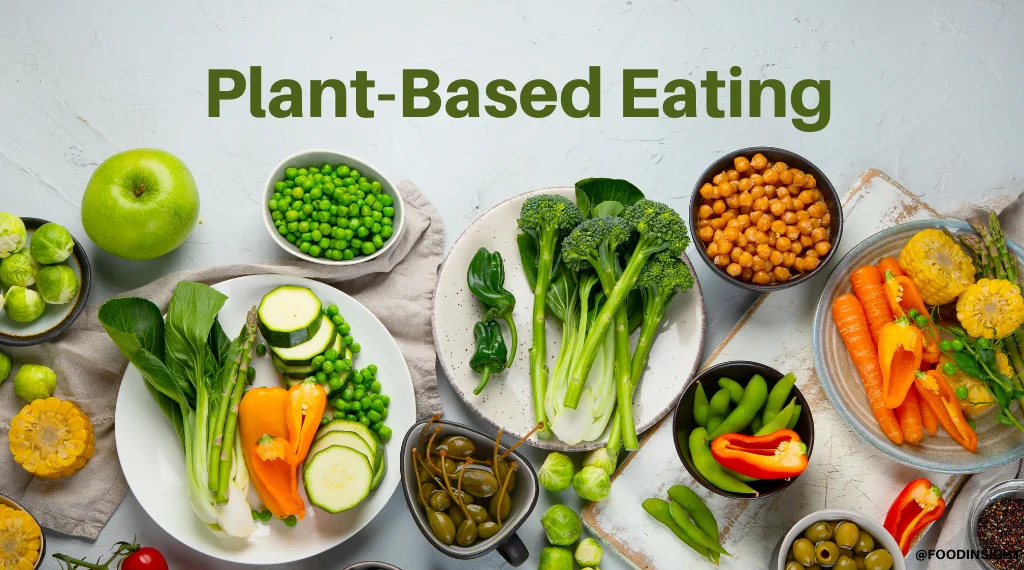Everything About Healthy Food: Advantages of Enjoying Plant Based Options
The conversation surrounding plant-based diet plans has actually gotten significant focus in recent years. Several individuals are discovering the potential health benefits, dietary benefits, and ecological impacts related to these nutritional selections. As individuals become extra knowledgeable about their food's influence on health and sustainability, concerns occur about the practicalities of taking on such a way of living. What specific adjustments can one expect, and just how might these choices improve not only personal wellness but likewise the planet's future?
Comprehending Plant-Based Diet Regimens
Lots of individuals associate plant-based diet plans mainly with vegetarianism or veganism, these diet regimens can encompass a large variety of consuming patterns that prioritize entire, minimally refined plant foods. Such diet regimens often consist of fruits, veggies, entire grains, seeds, legumes, and nuts, while removing or restricting animal products. This flexibility allows individuals to customize their dietary selections according to dietary requirements and individual choices. Some may take on a largely plant-based diet while still sometimes consuming meat or dairy products, usually described as a flexitarian strategy. The emphasis remains on including even more plant foods, which can bring about a diverse array of flavors and meals. Comprehending these numerous analyses of plant-based eating is essential for valuing its access and appeal in contemporary food society.
Health Benefits of Plant-Based Foods
The health advantages of plant-based foods are considerable, using a nutrient thickness advantage that sustains general well-being. Research study indicates that these foods can enhance heart health and wellness and play an important function in reliable weight management. By including extra plant-based alternatives, people may enhance their dietary options and promote long-term wellness.
Nutrient Density Benefit
Nutrient thickness plays an important role in the wellness benefits of plant-based foods, making them a compelling option for those seeking a balanced diet regimen. Plant-based foods, such as fruits, veggies, legumes, nuts, and entire grains, are often abundant in important vitamins, minerals, and antioxidants while being lower in calories. This high nutrient density enables individuals to consume fewer calories while still meeting their dietary needs. Furthermore, these foods are packed with nutritional fiber, advertising digestion health and wellness and assisting in weight management. By integrating nutrient-dense plant-based options, consumers can enhance their overall health and wellness, sustain their immune systems, and reduce the risk of persistent illness. Inevitably, the nutrient density of plant-based foods emphasizes their value in a health-conscious way of life.
Heart Wellness Renovation

Weight Management Support
In addition to advertising heart health and wellness, a plant-based diet plan can significantly help in weight management. This dietary approach highlights whole foods such as fruits, vegetables, legumes, nuts, and whole grains, which are usually lower in calories and higher in fiber compared to animal-based items. The high fiber web content aids enhance satiation, minimizing general calorie intake. Moreover, plant-based diet plans are frequently abundant in essential nutrients while low in harmful fats, making it easier to preserve a healthy weight. Plant Based Chicken. Study shows that people that adopt a plant-based lifestyle often read this tend to have lower body mass indexes (BMIs) and experience even more successful weight management compared to those that eat meat-heavy diet regimens. Consequently, embracing plant-based alternatives is a critical option for effective weight monitoring
Nutritional Value of Plant-Based Ingredients
Plant-based active ingredients are rich in important nutrients, supplying a varied array of vitamins, minerals, and anti-oxidants that contribute to overall health. A contrast of protein sources discloses that while pet items are usually considered as exceptional, many plant-based choices supply sufficient protein and various other valuable substances. Recognizing the nutritional worth of these ingredients can aid people make notified nutritional choices.
Important Nutrients in Plants
Nutrient-rich ingredients found in plants supply a diverse selection of crucial vitamins and minerals that add considerably to general health. These active ingredients are rich in vitamins A, C, and K, which sustain immune function, vision, and blood clotting, specifically. Additionally, plants provide vital minerals such as magnesium, calcium, and potassium, crucial for heart health and wellness, muscle mass feature, and bone toughness. The existence of fiber in plant-based foods help digestion and promotes a healthy and balanced digestive tract microbiome. Anti-oxidants, located perfectly in vegetables and fruits, assistance battle oxidative stress and anxiety and reduce swelling. Numerous plant foods are reduced in calories yet high in nutrients, making them an excellent option for those looking for to maintain a healthy and balanced weight while making certain optimal nutrient consumption.

Comparing Healthy Protein Sources
Healthy protein resources differ considerably in their dietary profiles, with plant-based ingredients offering special benefits. Unlike pet proteins, which commonly include saturated fats and cholesterol, plant healthy proteins tend to be lower in these harmful elements. Legumes, nuts, seeds, and whole grains are abundant in essential amino acids, fiber, vitamins, and minerals. Lentils give high healthy protein content along with considerable iron and folate, while quinoa is a full protein, offering all 9 essential amino acids. Furthermore, plant-based healthy proteins are often come with by antioxidants and phytochemicals that sustain total wellness. The change to plant-based healthy protein sources not only enhances dietary consumption but likewise lines up with sustainable nutritional practices, lowering ecological impact and advertising long-term health and wellness benefits.
Ecological Effect of Plant-Based Consuming
As awareness of climate adjustment grows, lots of people are checking out sustainable dietary choices that can considerably minimize their environmental impact. Plant-based consuming has actually emerged as a considerable factor to reducing greenhouse gas emissions, which are primarily connected with livestock manufacturing. The cultivation of fruits, vegetables, legumes, and grains commonly calls for fewer resources, such as water and land, contrasted to animal farming. Furthermore, plant-based diet plans can result in lowered logging, as less land is required for grazing livestock or expanding pet feed. By changing towards plant-based official statement options, customers can support biodiversity and advertise much healthier ecological communities. In general, accepting plant-based eating not only benefits individual wellness however additionally stands for a vital action toward environmental sustainability and conservation initiatives.
Overcoming Common Misconceptions
While numerous individuals recognize the benefits of a plant-based diet plan, numerous misunderstandings frequently hinder them from completely embracing this lifestyle. A typical belief is that plant-based diet regimens do not have sufficient healthy protein; nonetheless, countless plant resources, such as beans, nuts, and tofu, supply adequate protein. Furthermore, some think that this diet plan is pricey, when as a matter of fact, staples like beans, rice, and seasonal veggies can be rather economical. An additional misunderstanding is that plant-based consuming is overly restrictive, whereas it in fact supplies a diverse variety of foods and tastes. Ultimately, many stress that a plant-based diet plan might cause deficiencies, yet with appropriate planning, individuals can acquire all required nutrients, consisting of nutrients, while delighting in a wide range of scrumptious meals.
Tips for Transitioning to a Plant-Based Lifestyle
Making the shift to a plant-based lifestyle can be an enhancing experience, though it usually calls for some assistance to navigate the first modifications. First, people are encouraged to start slowly, integrating even more fruits, veggies, legumes, and whole grains into their dishes while lowering meat and milk intake. Meal planning is vital; preparing an once a week food selection can assist alleviate the modification and stop last-minute harmful options. Checking out brand-new dishes and cooking approaches can also enhance the experience and keep exhilaration regarding plant-based eating. Furthermore, signing up with support system or communities can supply motivation and share important pointers. Remaining educated regarding nourishment warranties well balanced meals, stopping shortages while cultivating a healthy, rewarding plant-based lifestyle.

Delicious Plant-Based Meal Ideas
Exploring tasty plant-based meal ideas can motivate individuals to accept a much more nutritious diet plan. One preferred alternative is a hearty quinoa salad, including cherry tomatoes, cucumber, and a zesty lemon-tahini dressing. One more fave is a mouthwatering lentil stew, loaded with carrots, celery, and aromatic natural herbs, ideal for a comforting supper. For morning meal, overnight oats made with almond milk, chia seeds, and covered with fresh berries offer a healthy start to the day. Furthermore, a lively veggie stir-fry with tofu and a variety of colorful veggies can be a quick yet pleasing dish. Ultimately, creamy avocado toast on whole-grain bread, sprinkled with flavors and seeds, supplies a basic yet savory snack. These meals display the variety and splendor of plant-based consuming.

Regularly Asked Questions
Can a Plant-Based Diet Regimen Provide Sufficient Healthy Protein?
The question of whether a plant-based diet plan can offer enough protein is typical. Countless resources, including beans, nuts, seeds, and entire grains, can fulfill protein requires successfully, sustaining a healthy and well balanced diet for individuals.
Are Plant-Based Diets Appropriate for Kid?
The viability of plant-based diet plans for children relies on careful preparation. Sufficient nutrients have to be ensured, consisting of vitamins, proteins, and minerals. With appropriate assistance, such diet regimens can support healthy and balanced development and advancement in youngsters.
Just how Do I Dine Out on a Plant-Based Diet?
Eating in restaurants on a plant-based diet regimen involves looking for restaurants with diverse menus, asking for modifications, and discovering vegan-friendly options. Planning in advance and interacting nutritional choices can improve the dining experience while maintaining nutritional selections.
What Are Common Irritants in Plant-Based Foods?
Common allergens in plant-based foods include soy, gluten, nuts, and seeds - BBQ Sauces. Individuals complying with a plant-based diet plan ought to recognize he has a good point these allergens and read labels very carefully to prevent damaging reactions and assure secure usage
Can Plant-Based Diets Help With Weight Management?
Research indicates that adopting a plant-based diet regimen may assist in weight loss due to its commonly reduced calorie density and greater fiber material. This combination can boost satiation, helping people handle their calorie intake efficiently. Many individuals link plant-based diets mainly with vegetarianism or veganism, these diet plans can encompass a vast array of eating patterns that prioritize whole, minimally processed plant foods. Nutrient density plays an essential role in the health benefits of plant-based foods, making them a compelling choice for those seeking a well balanced diet. Plant-based diets have been revealed to noticeably enhance heart wellness, as they typically have elements that support cardiovascular feature. In addition to advertising heart health, a plant-based diet regimen can significantly help in weight management. An usual idea is that plant-based diets do not have sufficient healthy protein; nonetheless, countless plant sources, such as legumes, nuts, and tofu, supply adequate healthy protein.